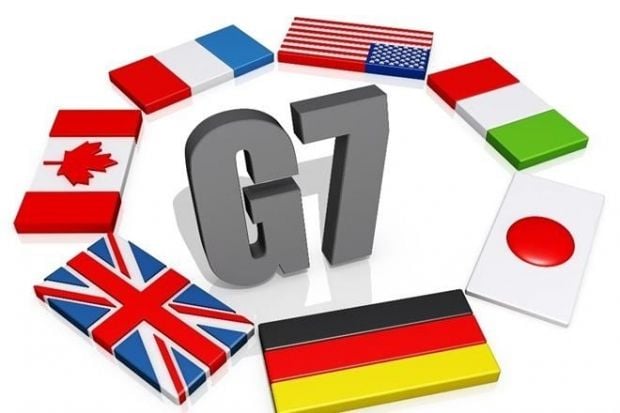
Ukrainian interest. The dialectic of the G7, the Kremlin’s point of view and a course correction
The G7 Summit is being held without RPutin, and this impacts Russia's foreign policy. The Kremlin is striving to impose on the global community its own view of events in the Donbas. And Ukraine is ever more vocal about its Euro-Atlantic choice.
Since the annexation of Crimea and fomenting conflict in the Donbas, Russia has been showing an example of downshifting in foreign policy: the artificial empire of Vladimir Putin has easily exchanged its status as one of the world’s leading countries for that of a state that is globally treated with caution. So the current G7 Summit in Bavaria is being held without the participation of Russia’s leader. Moreover, the heads of major world powers discuss prospects of strengthening sanctions against the aggressive Kremlin. The Ukrainian issue is on the top agenda of the debate, and Petro Poroshenko has tried to enlist the support of all participants in discussions.
The representatives of Russia are acting asymmetrically. And it is certainly not about the promise not to ask to be invited back to the club as there is a certain consensus about the further exclusion of Russia from the G7. The Kremlin has tried to raise the stakes by initiating an offensive by the militants near Maryinka. This was preceded by the failure of the meeting of the Contact Group in Minsk by the Russian representative Azamat Kulmukhametov. Then there was not only an attempt to seize the village near Donetsk, but an operation with far-reaching consequences.
It was a far-reaching political provocation - not only an attempt to increase the militant-controlled territory and compromise the internal political situation in Ukraine, but also to frame Ukraine for violating the Minsk ceasefire agreement. Both the Russian Foreign Ministry, and personally Sergei Lavrov put a lot of effort into trying to convince the international community that this was the case. The reason for the information attack on the far-from-perfect agreement is simple – this format of conflict settlement has been recognized by the international community and Russia has often been criticized for neglecting it. Therefore, Moscow profits from inciting Russia-controlled militants to attack government forces in order to trigger a new round of conflict in the Donbas and thus provide itself with more space for action. Provocation in Maryinka allows for a realistic assessment of the statements of the Kremlin on the support of the territorial integrity of Ukraine.
Meanwhile, Ukraine made several changes in its foreign policy rhetoric. Instead of the recent line of the country’s European integration, after the Riga summit “Eastern Partnership” the president, the prime minister and the foreign minister have started to actively discuss the prospects of rapprochement with NATO. Pavlo Klimkin even noticed that there is no alternative to this process. The position of NATO Secretary General Jens Stoltenberg, actively criticizing Russia, has contributed to such a change in rhetoric. However, Ukrainian top officials understand that there is no consensus between NATO member states on Ukraine joining the alliance, and there is a need for major changes in defense policy and the real implementation of reforms. Strictly speaking, it is transformation in Ukraine that is the key to the restoration of its status of an independent subject of foreign policy.
Yevgeny Magda

